© startupstockphotos.com
Orientation Information
On arrival at Heidelberg University, graduate students will be aided by the HGSFP Central Office.
Heidelberg is a small town with ca. 150 000 inhabitants, of which ca. 30 000 are students at the University. The University itself, with many of its Physics Institutes lies in the valley of the river Neckar. The landscape in the valley is extremely flat - a good means of transport for students is thus generally a bicycle. There is of course an excellent bus and tram system too, so that one does not necessarily need a car at all. Some of the Physics Institutes, however, are on the mountain (see Max Planck Institutes) and these are better reached by car or bus.
Useful links
Please note that in accordance with German law, all persons must be registered with the local authorities in the area in which they live. The Graduate Academy of Heidelberg University will aid you in all these aspects.

© WikimediaImages / pixabay.com
Supervision guidelines
The advisor, thesis committee and students play different roles during the ca. three years of graduate study. You may have some questions as to what is expected from you and what you can expect from others. In order to help answer these questions, the student representatives have, in conjunction with the Directorate of the Graduate School, set out the most important points with regard to supervision of students.
The guidelines have been ratified by the Department of Physics and Astronomy.
Course requirements
For each student, a personal course plan must be developed by the doctoral student together with the thesis committee, and should be designed to meet the personal interests of the student. Students are not required to repeat coursework that they have successfully completed elsewhere.
In general, a minimum of 4 hours per week per semester for the first two years (or 16 units in total) in coursework in form of lectures, block courses, journal clubs, workshops, etc. is required.
In addition to the courses listed in the LSF, graduate students are encouraged to attend a colloquium in their research field, as well as the general physics colloquium.
Graduate students may also actively participate in the planning of courses (see "Graduate Days") and inviting speakers to the school.
At the end of each semester, you should record your courses taken and submit the form to the Central Office of the HGSFP.
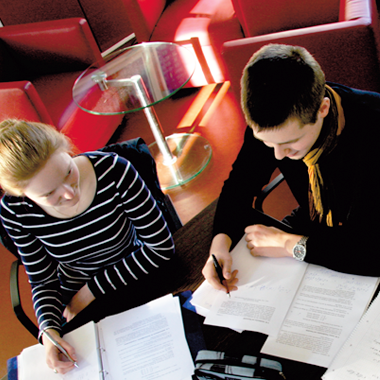
© Sandra Klevansky

© Marius Ciocirlan / unsplash.com
Teaching requirements
Doctoral students are expected to tutor for 2 teaching units, corresponding to 4 SWS, during the course of their doctoral studies.
Tutoring in theoretical physics
Please contact the coordinator, Dr. Eduard Thommes.
Tutoring in experimental physics
Please contact the coordinator, Dr. Edith Engelhardt (Beginner practicals (PAP1, 2), service courses (medicine, physics A/B), basis course, environmental lectures), or Prof. Klaus Reygers (Advanced practicals).
Tutoring in astronomy
Please contact the coordinator for astronomy practicals, Prof. Jochen Heidt.
Financial aid
The Graduate School offers financial aid for several aspects of graduate studies
All graduate students of the HGSFP are entitled to apply for funding for the following: (a) Soft skills courses at Heidelberg University (b) Bridging funds, funds to complete a thesis, or for the first year of our integrated master/doctoral programme
The Directorate may, at its discretion, fund other student activities. Before applying for such, we request that you contact the student representatives of the Graduate School, who may integrate your request into the student project plan for which a specific amount of funds is reserved annually.
Please note that we cannot fund attendance of conference visits, workshops or other scientific meetings (for exceptions, see equal opportunity funding). However you can apply to the Graduate Academy for support of this kind, see the link on the right hand side.
Should you wish to apply for support as listed above - or any other forms of support required - please fill out the form that you will find on the right hand side (link).
Equal Opportunity Funding
In order to support women in science, the Heidelberg Graduate School for Physics offers special aid for female doctoral students in specific instances, in addition to the usual support provided for all doctoral students, provided that sufficient funds are available.
Special support includes: (c) Financial aid for female doctoral students whose doctoral studies are delayed by childbirth or child care. Family support can also be made available for male doctoral students, if the case warrants it. Also support to attend winter and summer schools, meetings and conferences.
Doctoral students requesting support must apply to the HGSFP in the usual way by completing the form below. (Login with your Uni-ID is required.)

© ivanastar / Getty Images / iStock
Thesis requirements
The thesis must contain scientifically sound research that is performed independently by the doctoral student. The scientific content should constitute a contribution to the progress of science. Results that are obtained through the research of the student and which are published as a part of the thesis should also be published - with the consent of the advisor - in highly accredited scientific journals. The thesis may be written in German or English. A short summary in both languages should precede the main text.
Final Examination Forms
It is the onus of each student to register for the final examination.
Graduate students who are completing their degrees must register for the final oral examination for the degree of Dr. rer. nat.
Please consult the documents before suggesting the examination committee.
Note that examinations can take place at 9:00, 10:30, 14:00 and 15:30. It is your duty to ensure that your suggested examination committee can meet on the date and time required.
Special cases - rules for external examiners and cumulative theses.
Submit the Final Exam Registration Form by the registration deadline fully completed to the Central Office. In filling out this form, you must list four examiners representing at least three examination fields. A list of the current examiners and their fields of examination can be found on the internal pages of the departmental website.
For the deadline of submission of all documents, you must submit all documents in the checklist including the application for the Combined Faculty of Mathematics, Engineering and Natural Sciences and the sworn affidavit, to the Central Office of the HGSFP.
Coverpage template: Choose either the German or the English one.
End of thesis: Please note that your thesis should end with two separate bibliographies - the first should list your own publications and comment on which of these are used in the thesis, the second should have all relevant references (and can include your own publications).
Proof of publication forms, to be taken to the University library after the final examination. Please wait for our email, as you need to pick up the authorized version of your thesis (signed by the Dean) from the HGSFP Central Office first.
Prizes
Faculty Prize
The Department of Physics and Astronomy awards a faculty prize for the best dissertation in the previous two semesters. The prize is sponsored by the Wilhelm and Else Heraeus Foundation and was awarded for the first time in 2019.
Calls for applications are made in the summer of each year, as applications must reach the Dean's office by the 31st August of that year.
Wilma Moser Prize
The Combined Faculty of Mathematics, Engineering and Natural Sciences at Heidelberg University administers the Wilma Moser Prize, which goes to the youngest excellent person completing their degree in that year.
In 2023, the Wilma Moser Prize was awarded to Dr. Lena Spillecke, for her dissertation on Resonance Investigations on Metal-Organic Molecular Compounds.
Faculty Prizes
2022 Winners
Sabine Harribey
"Renormalization in tensor field theory and the melonic fixed point"
Marvin Holten
"From Pauli Blocking to Cooper Pairs: Emergence in a Mesoscopic 2D Fermi Gas"
2021 Winners
Martin Braß
"Ab-initio calculations of the electron capture spectrum in 163 Ho"
Lennart Volz
"Particle imaging for daily in-room image guidance in particle therapy"
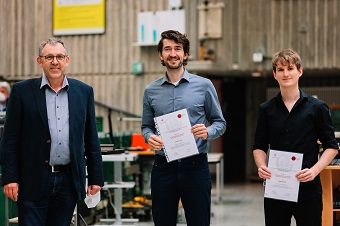
2020 Winners
Jonas Karthein
"Next-Generation Mass Spectrometry of Exotic Isotopes and Isomers"
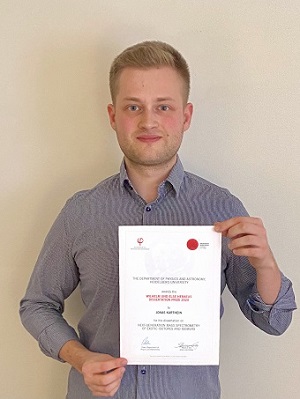
Gonzalo Alonso Alvarez
"The Universe as our Lab: Axions and other Light Dark Matter Candidates"
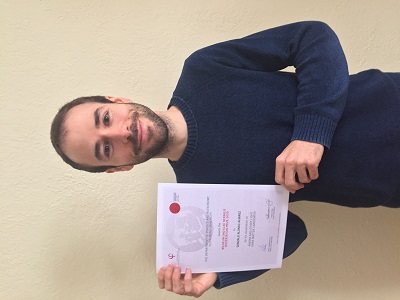
2019 Winners
Anna-Christina Eilers
"The Formation and Growth of Supermassive Black Holes"
Dominik Mitzel
"Suche nach neuer Physik in seltenen Charm Zerfällen bei LHCb"
Doctoral student Meetings
Doctoral student meetings and events are organized by the elected student representatives. You can contact them via studentreps@gsfp.uni-heidelberg.de.

© startupstockphotos.com



 HGSFP
HGSFP
